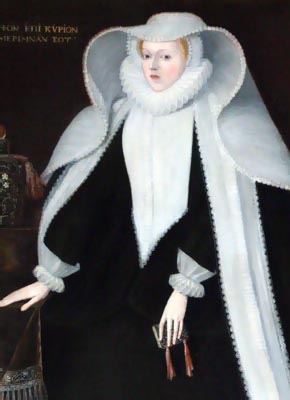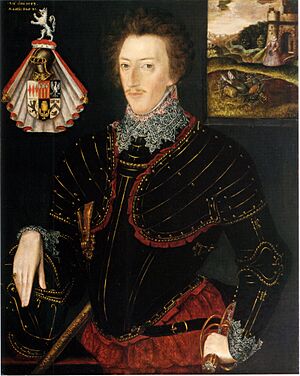Thomas Posthumous Hoby facts for kids
Sir Thomas Posthumus Hoby (born in 1566 – died 30 December 1640) was an English gentleman and politician. He was also known as Hobie, Hobbie, and Hobby. He served in the English Parliament many times between 1589 and 1629.
Hoby was a Puritan, which meant he followed a strict form of Protestant Christianity. Some people believe he was the inspiration for the character Malvolio in William Shakespeare's famous play, Twelfth Night.
Contents
Life Story of Sir Thomas Hoby
Thomas Hoby was born in 1566, after his father, also named Sir Thomas Hoby, had passed away. His father had been an ambassador for England in France. Because he was born after his father's death, he was given the extra name "Posthumus." His mother was Elizabeth Cooke, a very smart woman whose father was a famous scholar.
Thomas was quite small, and people nicknamed him "the little knight" because of his short height. He went to school at Eton College and then to Trinity College, Oxford, starting when he was only eight years old.
In 1574, his mother married again to John, Lord Russell. This made Thomas step-brother to three more children. His mother's sister was married to William Cecil, 1st Baron Burghley, who was a very important advisor to Queen Elizabeth I. This meant Thomas was cousins with Robert Cecil, 1st Earl of Salisbury, who also became a top advisor to the Queen. Thomas also had famous cousins like Francis Bacon, a well-known philosopher, and Anthony Bacon, who worked as a spy.
Hoby's Political Career
In 1589, Thomas Hoby was first elected as a Member of Parliament for Appleby. He was elected again for Appleby in 1593.
In 1595, Hoby married Margaret Sidney. She was a wealthy woman who had been married twice before. They made their home at Hackness in Yorkshire, but they did not have any children. Margaret Hoby is famous because she kept a detailed diary, which helps historians understand what life was like back then.
Thomas Hoby continued his political career. In 1597, he was elected MP for Yorkshire and Scarborough. He was elected for Scarborough again in 1604. Later, he was elected MP for Ripon many times: in 1614, 1621, 1624, 1625, 1626, and 1628. He also served as a chief local official, called the Custos Rotulorum of the North Riding of Yorkshire, from 1621 to 1626.
Hoby and Shakespeare
As a Puritan, Thomas Hoby was very serious about his beliefs. In 1600, he took legal action against some neighbors. He claimed they had caused trouble at his house, played cards, and made fun of his Puritan beliefs.
Some historians believe that the character of Malvolio in William Shakespeare's play Twelfth Night was based on Sir Thomas Hoby. They think Hoby's legal action in 1600 might have inspired a scene in the play where Malvolio is upset by noisy, drunken celebrations.
Hoby was also known for being a very careful and hardworking magistrate, which is like a local judge.
When his mother died in 1609, Hoby inherited land in Gloucestershire. In 1617, he also inherited the estates of his older brother, Sir Edward.
Death and Memorials
Sir Thomas Hoby passed away on 30 December 1640. He was buried with his wife in the church at Hackness. In his will, he left his estate at Hackness to a relative named John Sydenham. He also left money to other family members and gave his servants three years' wages.
A memorial was put up for him in the Hackness church in 1682 by Sir John Posthumous Sydenham, who was the son of Hoby's main heir. There is also a larger memorial for him in All Saints' Church, Bisham. This memorial includes a painted statue of Hoby as part of a family group on his mother's monument.
Even though Sir Thomas Hoby did not have any children, his brother Edward had a son named Peregrine Hoby. Peregrine's son, Sir Edward Hoby, continued the family line, and their noble title (baronetcy) lasted until 1766.
|
 | Misty Copeland |
 | Raven Wilkinson |
 | Debra Austin |
 | Aesha Ash |



